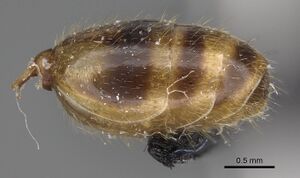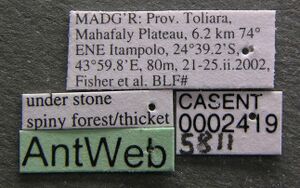Royidris diminuta
| Royidris diminuta | |
|---|---|

| |
| Scientific classification | |
| Kingdom: | Animalia |
| Phylum: | Arthropoda |
| Class: | Insecta |
| Order: | Hymenoptera |
| Family: | Formicidae |
| Subfamily: | Myrmicinae |
| Tribe: | Crematogastrini |
| Genus: | Royidris |
| Species group: | notorthotenes |
| Species: | R. diminuta |
| Binomial name | |
| Royidris diminuta Bolton & Fisher, 2014 | |
Both series of diminuta, which nests under stones in spiny forest, were included under notorthotenes by Heterick (2006).
Identification
A member of the notorthotenes species group. Bolton and Fisher (2014) - This small form is separated from Royidris notorthotenes with some reservations. In terms of general morphology and critical indices, workers of the two are similar, but in terms of absolute dimensions there is a distinct and persistent gap between them in the ranges of all measurements, with no trace of intermediates. No species of Royidris show any signs of worker dimorphism, but the possibility that the diminuta workers represent the undersized first brood of new foundress queens of notorthotenes cannot be entirely ruled out. An alternative hypothesis, that diminuta, Royidris etiolata and notorthotenes constitute a single species, results in a monomorphic species with SI 115–158, an exceptionally broad range. All three species are found in sympatry in the Mahafaly Plateau.
Keys including this Species
Distribution
Endemic to Madagascar.
Latitudinal Distribution Pattern
Latitudinal Range: -24.650556° to -24.650556°.
| North Temperate |
North Subtropical |
Tropical | South Subtropical |
South Temperate |
- Source: AntMaps
Distribution based on Regional Taxon Lists
Malagasy Region: Madagascar (type locality).
Distribution based on AntMaps
Distribution based on AntWeb specimens
Check data from AntWeb
Countries Occupied
| Number of countries occupied by this species based on AntWiki Regional Taxon Lists. In general, fewer countries occupied indicates a narrower range, while more countries indicates a more widespread species. |

|
Estimated Abundance
| Relative abundance based on number of AntMaps records per species (this species within the purple bar). Fewer records (to the left) indicates a less abundant/encountered species while more records (to the right) indicates more abundant/encountered species. |

|
Biology
Castes
Males have yet to be collected.
Queen
Images from AntWeb
     
| |
| Queen (alate/dealate). Specimen code casent0002419. Photographer Michele Esposito, uploaded by California Academy of Sciences. | Owned by CAS, San Francisco, CA, USA. |
Nomenclature
The following information is derived from Barry Bolton's Online Catalogue of the Ants of the World.
- diminuta. Royidris diminuta Bolton & Fisher, 2014: 50, figs. 48-50 (w.q.) MADAGASCAR.
- Type-material: holotype worker, 5 paratype workers.
- Type-locality: Madagascar: Prov. Toliara, Mahafaly Plateau, 6.2 km. 74° ENE Itampolo, 80 m., 24°39.2’S, 43°59.8’E, 21-25.ii.2002, BLF 5814, CASENT0002420 (holotype), under stone, spiny forest thicket (B.L. Fisher et al); paratypes with same data (all BLF 5814).
- Type-depository: CASC.
- Distribution: Madagascar.
Unless otherwise noted the text for the remainder of this section is reported from the publication that includes the original description.
Description
Worker
(holotype in parentheses). TL 2.8–3.0 (3.0), HL 0.66–0.73 (0.72), HW 0.50–0.58 (0.58), CI 76–81 (81), SL 0.66–0.73 (0.70), SI 121–130 (121), PW 0.34–0.38 (0.37), WL 0.88–0.96 (0.96) (7 measured). EL 0.16–0.18 (EL/HW 0.30–0.32). MfL 0.66–0.76 (MfL/HW 1.25–1.33, MfL/MfH 3.36–3.80).
Matching the description of Royidris notorthotenes, and with critical indices falling within the same ranges, but diminuta much smaller in absolute measurements. For comparison of measurements see Table 2, Bolton and Fisher 2014.
Queen
(gyne). Alate when virgin. Very much larger than the worker. TL 6.8, HL 1.25, HW 1.21, CI 97, SL 1.04, SI 86, PW 0.90, WL 2.08, EL 0.36 (EL/HW 0.30), MfL 1.22 (MfL/HW 1.01, MfL/MfH 4.36) (1 measured).
Type Material
Holotype worker (top specimen of three on pin), Madagascar: Prov. Toliara, Mahafaly Plateau, 6.2 km. 74° ENE Itampolo, 24°39.2’S, 43°59.8’E, 80 m., 21–25.ii.2002, BLF 5814, CASENT0002420, under stone, spiny forest/thicket (Fisher et al.) (California Academy of Sciences). Paratypes. 2 workers on same pin as holotype, 2 workers with same data but CASENT0002421, 1 worker with same data but CASENT0009802 (CASC).
References
- Bolton, B. & Fisher, B.L. 2014. The Madagascan endemic myrmicine ants related to Eutetramorium (Hymenoptera: Formicidae): taxonomy of the genera Eutetramorium Emery, Malagidris nom. n., Myrmisaraka gen. n., Royidris gen. n., and Vitsika gen. n. Zootaxa 3791:1–99. doi:10.11646/zootaxa.3791.1.1

